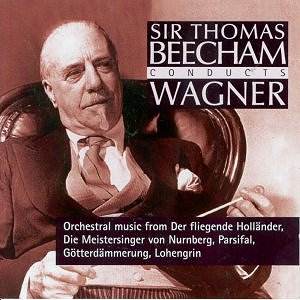This is probably the finest of the four Sony Classics
reissues of Beecham’s American Columbias of 1951-54. It has all Beecham’s
admirable qualities of rhythm, melodic contour, elegant phrasing and
passionate generosity and no mannerisms whatsoever to impede the linear
movement of each chosen piece. Firstly however the matter of recording
dates. The bulk was recorded in 1954, the Prelude to Act I of Lohengrin
in 1951. Two pieces, the Funeral Music from Götterdämmerung
and the Good Friday Music from Parsifal are noted as having no available
recording dates. They were however part of the series recorded by Philips
for American Columbia en bloc during December 1953 at Walthamstow Town
Hall – and the Philips’ session sheets have since been destroyed, only
the Artists’ Files at Columbia’s New York headquarters surviving.
Beecham’s last Wagner opera at Covent Garden was Die
Meistersinger in 1951 though he continued to give sporadic Wagner evenings
in the concert hall (1953, 1956 plus a half of a concert in 1958). His
recordings here show, as do all these extracts, an accustomed level
of eloquence and orchestral sophistication. They maintain a fruitful
balance between heated engagement and finesse and one moreover that
never slides into either glib grandiloquence or false gravity. Strings
are searingly active in the Dance of the Apprentices, Beecham shaping
orchestral diminuendi with practised authority and insight; listen to
the lower string counter-theme at 2’01 for an example of clarity of
line and appropriate weight of application. And the Entry of the Masters
shows his vigorous but not over-emphatic sensibility toward Wagner as
a whole. He may have been looked down upon as a less than philosophically
engaged Wagnerian over the years but this is to misunderstand utterly
the conductor’s Wagnerian aesthetic which recoiled against the elevation
of the Pagan in Wagner.
Pellucid strings animate the Good Friday Music, red-blooded
brass course through the overture to The Flying Dutchman, orchestral
strands are at all times audible and animated in the Funeral Music from
Götterdämmerung, translucent violins flicker and fleck the
final almost silent bars of the Prelude to Act I of Lohengrin. This
is not mere panache, not mere orchestral frivolity; this is conducting
of judicious understanding of the emotive and technical requirements
of a particular structure from a particular work. In all these extracts
Beecham is wonderfully responsive and I strongly recommend his work
here as an example of a frequently overlooked component of his
conducting – his sheer musical intelligence.
Jonathan Woolf


